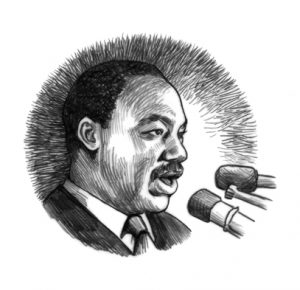If you wish, you can hear this sermon as it was preached in the pulpit of the United Church of Jaffrey. Simply click to the play button below.
Delivered to the United Church of Jaffrey
January 14th 2018
John 1:43-45 | Excerpt from “What is Man?” by Martin Luther King Jr.
Some years ago group of chemists who had a flair for statistics decided to work out the worth of a man’s body in terms of Market values of that day. They got together and did a lot of work and finally they came to this conclusion: the average man has enough fat in him to make about 7 bars of soap, enough iron to make a medium-sized nail, enough sugar to fill a shaker, enough lime to whitewash a chicken coop, enough phosphorus for about 2,220 matches, and enough magnesium for dose of magnesia. When all this was added up in terms of the market value of that day, it came to about 98 cents. Now,I guess, since the standards of living are a little higher today he can get about 1 dollar 98 for the average man.
This is interesting. Think about it. Man’s bodily stuff is worth only 98 cents. But can we explain the whole of a man in terms of 98 cents? Can we explain the artistic genius of Michelangelo in terms of 98 cents? Can we explain the poetic genius of Shakespeare in terms of 98 cents? Can we explain the spiritual genius of Jesus of Nazareth in terms of 98 cents? Can we explain the mystery of the human soul in terms of 98 cents? Oh no. There is something within man that cannot be explained in the terms of dollars and cents. There is something within man that cannot be reduced to chemical and biological terms, for man is more than a tiny vagary of whirling electrons. He is more than a wisp of smoke from a limitless smoldering. Man is a child of God
— Martin Luther King Jr. What is Man?
The Little Red Rubber Mallet
Do you know that little rubber mallet that doctor’s have?
You know the one I am talking about?
When I was growing up, I loved it when I was at the doctor’s office having a check up, and the little rubber mallet would appear —
it’s usually red, that little red mallet.
The doctor asks you to roll up your pant leg, and she — there are female doctors, so let’s make our pretend doctor a woman — she takes the little red rubber mallet, holds it a couple inches over your knee,
She takes aim…
and then she…
lets it fall on a specific spot on your knee…
And…
You know what happens?
The whole bottom half of your leg leaps upward.
This is called a “reflex.”
I used to love this, as a kid, because it was not painful at all… it was neat!
I loved this glimpse into the mysterious inner workings of my body.
I didn’t tell my leg to do that…
The reflex happens, as it were, without our intention.
It is automatic!
Something triggers it, and it happens before you are even aware of it.
I bring this up, this morning, because there are also situations in our lives, when something happens, and we respond automatically — without thinking.
This can also be called a reflex — right?
Someone says something, and we respond reflexively.
The reflexive response reveals something crucial about how we live our lives — the things that we believe…
And for this reason, reflexes are very revealing.
If we analyze them, we can learn a lot from them.
We are going to come across just such a reflex in today’s scripture lesson, so hold that thought for a little, if you please…because
before we get to the gospel lesson this morning, I have to tell you that…
Lucky Me
I feel rather pleased with myself this morning…
I find myself in a rather enviable position.
And why, you may ask me — am I in an enviable position?
I’ll tell you.
You see, each year, at around this time of year,
our entire country takes a day off from work…
and as we enjoy our day off —
As we listen to the radio in the car on the way down to the Hannafords
We may hear, again, the name of a certain gentleman.
Maybe when we get to the store, his name will be on the circular…
It is the name of an impressive human being
A historic figure
A person who, like few others, changed the essential character of this nation
And made it better.
Yes, yes, yes.. I can hear you saying … this is all true, but we all benefit from these things…what, pray, makes your position so enviable this morning? …. Well…
Let me answer that question with one of my own…
This great human being of whom I speak — I think you know to whom I refer…
— was he an engineer?
No
Was he a solicitor, a veterinarian or a machine worker?
Was he a Scuba diver, a choreographer or a breeder of labradoodles?
No he was not.
I am in an enviable position, this morning, because the person we are honoring this morning — and all day tomorrow — the person whose august visage is inscribed upon the cover of your bulletin this morning…
That gentleman
Was not a fireman, a forester or a flying instructor
He was not a president, senator or congressman.
No
He was none of those things.
He was…
a preacher…
The Reverend Dr. Martin Luther King, Jr’s vocation was the very same one that you, my brothers and sisters in Christ, have called me to fulfill, here in this humble pulpit, nestled in the majestic hills of New Hampshire.
98 Cents
In this spirit, allow me to let Doctor King frame for our reading of scripture this morning.
In the passage, that Sarah read for us earlier, Doctor King is trying answer the question “What is Man?”
The passage asks a question.
In this passage, Dr. King wonders if we can find out what a human is by reducing a human to his or her basic physical ingredients?
There is a funny and rather macabre twist built into this speculation. Dr King quotes a team of chemists who had a flair for statistics who calculated the market value of a human that is reduced to the most basic physical components — things like fat, iron, sugar and lyme.
The result is approximately 98 cents.
The number immediately strikes us as absurd.
It quite efficiently makes the point that there is, indisputably, something more to humans than our physical body.
There is something more. Something essential.
And whatever that essential thing is, it alters the value of a human from 98 cents, to something that has limitless, sacred value.
And this distinction, if you think about it, articulates the central claim that Reverend Martin spent his life in service of… that all humans share a mysterious sacredness that bestows upon us all a limitless value, and that this something — this essence — cannot be quantified in human terms.
Whether we are Mexican,
Haitian,
Salvadoran,
Nigerian,
Sudanese,
Venezuelan
Or even Norwegian —
We are all children of God.
And when this fundamental claim is at the core of our being — we begin our relationships with each other from the starting place of dignity.
This seems almost self-evident.
It could be like that little red rubber hammer — it seems so basically true, that it could be a reflex.
All of Christianity — indeed, I think, all of the world’s religion in all their forms — attempts to make this truth our reflex.
That we are all sacred.
Brown
Yellow
Black
White
Red.
Every shade, its own kind of sacredness
But it is clear that human nature includes other reflexes that have extraordinary power in our lives.
Take this morning’s gospel lesson, for example.
The Language of 98 cents
Jesus is in Galilee, and it seems like he is casting about for some disciples, because when he bumps into Phillip, he says “follow me”
Phillip hops to it!
Philip, who seems a rather excitable fellow, goes to find Nathaniel and you can almost hear Philip’s breathless excitement brimming through the text, when he reports to Nathaniel:
“We have found him of whom Moses in the law and also the prophets wrote, Jesus of Nazareth, the son of Joseph.”
But Nathaniel, hearing this, says:
“Can anything good come out of Nazareth?”
More than two thousand years has passed.
The Gospel of John has been translated many times into as many languages.
Generations of interpretation has been brought to bear…
And yet the reflex that is beneath this comment is unmistakably familiar.
When Nathaniel says…
“Can anything good come out of Nazareth?”
He is using the language of 98 cents.
To summarily dismiss a person because the person comes from a certain place is an act of prejudice.
It is an act of prejudice — and none of us has any trouble recognizing it as such, because we carry this tendency within us.
Sometimes we even act on it.
I think we tend to act on it as Nathaniel did — reflexively.
Prejudice is a reflex.
An ugly reflex.
Most of us can keep it in check, because we know it is wrong.
But there are individuals who are either incapable of keeping it in check, or they don’t believe such reflexes are wrong.
We saw a stark example of such an individual this week, who gave us a clear illustration of this ugly reflex in action.
Shall I quote him?
If I did, I fear I might defile the sanctity of this pulpit.
So I won’t.
Whew! That was close!
Our Essence
In closing, this morning, I cast my mind back to my college days when, as a senior, at Bates College, I lived in a dilapidated house a few blocks off campus with a group of interesting lads.
One day, one of these interesting lads – he was a physics major, by the way, comes up to me and says…
“Mark, can I borrow your Buddha.”
I had a little jade Buddha I’d brought back from my semester in Sri Lanka.
Sure, says I, getting him, and handing him the Buddha.
A month later, after I’d totally forgotten about the whole thing, my friend approached me with what I can only describe as a self-satisfied grin on his face.
“Dude” he says “Check this out.”
He led me to his room. In the corner of the room, there was a strange laser apparatus thingy siting on his desk. He switched off the lights fiddled with this thingy… and… LO and Behold!
There was my little jade Buddha, floating in the air.
As an independent study project for his physics seminar, he’d made a hologram of my Buddha!
In the interesting conversation that followed this event, my friend and I concluded that both physics and religion are essentially trying to do the same thing: which is explain mystery. The difference is that religion uses poetry, and physics uses numbers.
Though both, ultimately, are unsuccessful, they are both crucial to our pursuit of being human.
I still believe this to be true.
For example…
When Dr. King concludes that “Man is a child of God” he invokes a passage from the Book of Genesis (a book sacred to Jews, Christians and Muslims) that says humans are made “in the image of God.”
Though I am by no means an astrophysicist, I believe that this same notion is expressed by the assertion that all the building blocks of matter and, eventually life, were contained in the cataclysmic bang that created our universe.
As Joni Mitchell sang: We are stardust. Million year old carbon
And with this essential truth as our starting point, it stands to reason that our relationships can, and should, begin with the reflex of dignity.
This is our essence!
This is the truth of Reverend Martin.
This is the truth of Jesus.
Amen.



